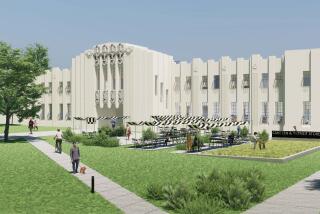YMCA Plans Would Close Haven for Pasadena Poor
- Share via
PASADENA — Charles Ostrander’s $235-a-month room at the downtown YMCA is a stuffy 10x12-foot rectangle that echoes with the sound of yelling in the hallways and street noise drifting in through the only window.
It is not much of a room, Ostrander says, but with only his $600-a-month Social Security check, he has come to accept the reality of sleeping on a bumpy mattress and sharing the bathroom down the hall with strangers.
“It’s not what I’m used to,” said Ostrander, 66, a retired real estate appraiser. “But it’s better than living on the streets.”
For Ostrander and nearly 130 other tenants, the YMCA has been a haven from the streets or from having to rent a more expensive apartment elsewhere.
But the YMCA is proposing to shut down and sell the 76-year-old building and use the money to build a new $13-million health and recreation center, without a hotel, across the street.
A YMCA task force commissioned to study the plan has concluded that the proposal would create a major housing problem by closing the largest of the few low-cost hotels left in the city.
The hotel’s closure would push many of the city’s elderly and poor, including Ostrander, onto the streets or force them to use more of their limited income on housing, the task force said.
“There is simply nothing else out there,” said Cindy Abbott, who heads the task force. Abbott is also the associate director of Union Station & the Depot, a social service agency that provides food and shelter for the needy.
The task force, which completed its study last month, has urged the YMCA board to abandon its plans to close the hotel portion of the facility, located on East Holly Street across from City Hall.
But Gene Gibba, general director of the Pasadena YMCA, said the board is committed to going ahead with its plans because the downtown building has deteriorated badly and it is time now to plan for the future.
The future, he said, lies with the health-conscious, middle-class families who now make up the bulk of the downtown YMCA’s membership and can afford to pay up to $486 per family in membership fees. And to attract new members, Gibba said the YMCA needs a new building, which will require the revenue from the sale of the old facility.
“We could be all things to all people, but we don’t have the resources,” he said. “It’s a hard decision, but housing is not the priority anymore.”
John Kershaw, president of the downtown YMCA board, said the organization is aware that closing the building would cause a housing problem. He said the YMCA has promised to find tenants new places to live.
But the Rev. G. Wooden Garvin, a member of the downtown YMCA board and the associate pastor of Pasadena Presbyterian Church, said finding new rooms for tenants is only a partial solution.
‘Cannot Be Replaced’
“If it were only a matter of transporting people, there would be no problem,” he said. “But the hotel provides a very special need in this community that cannot be replaced.”
Abbott said many of the city’s poor and elderly have relied for years on the YMCA, which rents rooms at rates ranging from $58.75 to $73.75 a week, and a handful of other inexpensive hotels in Old Pasadena.
Sam Brown, director of downtown YMCA operations, said the low-cost rooms, which are safe and conveniently located, also have served as an important steppingstone for people trying to get off the streets.
“It’s a starting point,” he said. “A lot of men use this place to regroup so they can go forward.”
The low-cost hotels, like the YMCA, typically have single rooms with shared bathroom and kitchen facilities.
But at least seven of them, including the El Rey, the Ritz, the Star and the Marine, which each had between 20 and 25 rooms, have been closed within the past 10 years to make room for redevelopment projects.
Today, only the YMCA, the Holly hotel and the Pierce hotel are left, according the task force’s report. The Holly has 26 rooms and the Pierce has 22.
Dorothy Miller, the manager of the Holly and Pierce hotels, said she rarely has a vacancy for her rooms, which rent for between $220 and $240 a month.
“I have people who have been here for 18 years,” she said. “People don’t move in or out unless someone dies.”
Because they are on sites that may be developed, both of the hotels might eventually close too, the owners say, although that decision is several years away.
If the YMCA hotel closes, some of its tenants, like 33-year-old Travis Daniels, will have no problem finding other housing. Daniels, who moved to the city from Grass Valley, Calif., said he plans to stay at the YMCA until he finds a permanent job and apartment.
“I’ve got the savings to rent an apartment now, but I’ll probably stay another month,” Daniels said. “It’s kind of primitive here, but it’s OK.”
Permanent Home
But for many others, a room at the YMCA is all they can afford, and they consider it their permanent home.
Glen Rutherford, 52, who gets $55 a week in unemployment benefits and supplements that with income from odd jobs, has lived at the YMCA for nearly five years.
“It’s fairly safe and the rent is cheap,” he said. “I’ll be here as long as the building is here.”
According to another YMCA study done by a group of social service workers and city officials, 80% of the tenants are employed, mostly in low-paying maintenance or service jobs in the downtown area. Their incomes range from $400 to $1,000 a month. About half are black or Latino, the study found.
Gibba said that before the YMCA decided to close the building, it conducted three studies on the feasibility of renovating the building. But renovation was rejected each time as too expensive.
Gibba said the YMCA is losing up to $60,000 a year, partly because of the high cost of maintaining the deteriorating building.
“We have the reality of a building that is eating us alive now,” he said. “I just hope we can continue operating it for the next year.”
Kershaw added that the deteriorating facility is also keeping people from joining the YMCA.
“The building is old and decayed, and our members are attracted to more modern facilities,” he said. “Obviously, there are greater revenues if your facilities are up to date.”
One resident, 36-year-old David Quail, said the YMCA should rename itself the Yuppie Men’s Convenience Accommodators because of its plans to close the hotel.
But even Quail, who has lived at the hotel since January, agrees that the facility is in poor condition.
Walls Are Cracked
The signs of decay are everywhere: Large patches of linoleum are torn from the floor, broken windows dot the building and the walls are cracked. Gibba said the building does not meet earthquake safety standards.
He said the new building, which would operate in conjunction with the Pasadena-Foothill Valley YWCA, would provide enough room and facilities to expand programs and membership.
The plan involves tearing down a portion of the existing YWCA across the street from the YMCA building and constructing a 90,000-square-foot facility that would include two swimming pools, handball and racquetball courts, a gymnasium, an aerobic workout room, a running track and classrooms.
The architecturally significant portions of the YWCA, a landmark building designed by Julia Morgan, will be strengthened, rotated to face City Hall and integrated into the new building.
The YMCA and YWCA have already raised $3.5 million and expect to begin construction on the two-year project in 1988, Gibba said.
Kershaw said the sale of the current YMCA property is critical to the project because it will provide an estimated $3.1 million for the construction of the new facility.
“The reality is we have to sell off this property to pull this project off,” he said.
Even critics of the YMCA’s plan to close the hotel agree that the organization needs a new building.
“They cannot continue in what they have got,” Garvin said.
But he added that the YMCA has done little to search for a way to save the 130 hotel rooms.
“Many YMCAs have found ways to move into the future and keep their hotels,” Garvin said. “They are either going to add to the problem or help solve it. I think it would be irresponsible if they didn’t take responsibility.”
Supporters of maintaining the YMCA hotel are banking on finding a way to renovate the old building, although no one knows at this point if it is feasible.
City Reviews Studies
Leslie Lambert, the city’s housing development manager, said the city has begun reviewing the YMCA’s earlier renovation studies and is also preparing to have the Los Angeles Community Design Center, a private, nonprofit design and architecture firm, do another renovation study.
But Lambert added, “I don’t think the city has the resources or inclination to get into this.”
She said that state and federal funds are available for renovating low-cost hotels.
For example, the Glendale Family YMCA renovated its 83-room hotel in 1983 using $650,000 in federal block grant funds, said Carl Meseck, general manager of that facility.
The state Department of Housing and Community Development also has three low-interest loan programs for the renovation of residential hotels, said department spokeswoman Julie Stewart.
Stewart said the largest of the loan programs, the Special User Rehabilitation Program, charges 3% interest and is expected to have $2.5 million available in next year’s budget.
But Stewart added that the funds are limited and the competition for them is fierce.
Gibba said no amount of study or debate will change the fact that the YMCA does not have the money to solve the housing problem on its own.
“It’s not fair for any one organization to bear the burden of providing housing,” he said. “It’s going to have to be a community effort.
Donna Ahrens, the executive director of the YWCA, added: “It’s not the YMCA’s problem; it’s the city and the community’s problem. I don’t see why the YMCA has to take the brunt of the bad publicity.”
Garvin agreed that if the problem is to be solved, it will have to be tackled by several groups that pool their resources.
“I suspect it will need the effort of the churches, the city and the YMCA to stand up with one voice to get the community to respond,” he said.
“This is a city of great resources, and there is sensitivity to what is happening on the streets. In the end, I think this city will support us.”
More to Read
Sign up for Essential California
The most important California stories and recommendations in your inbox every morning.
You may occasionally receive promotional content from the Los Angeles Times.














